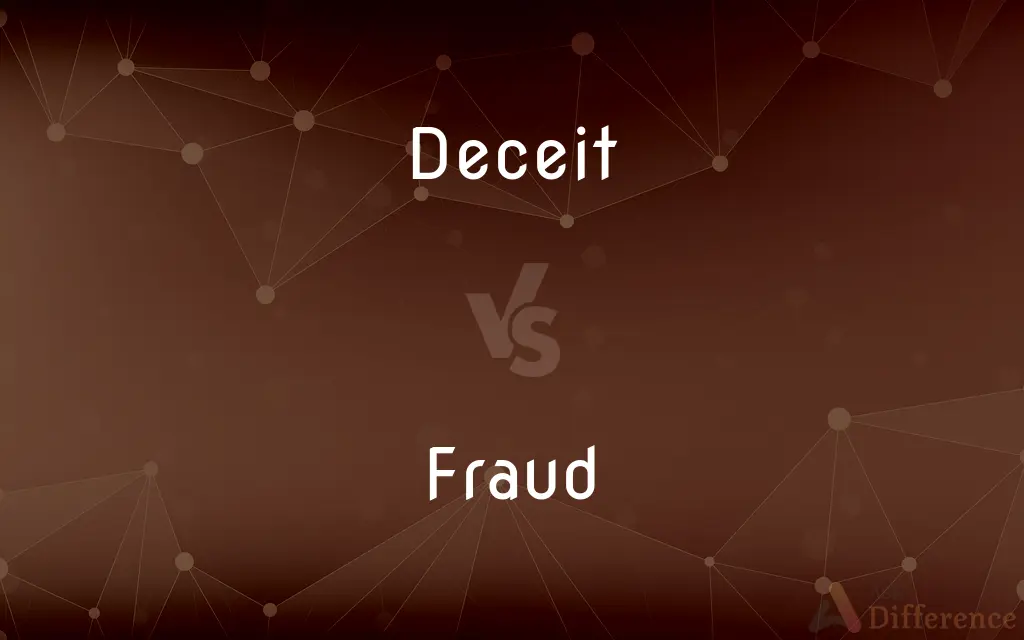Deceit vs. Fraud — What's the Difference?
By Tayyaba Rehman & Urooj Arif — Updated on March 20, 2024
Deceit involves misleading or deceiving someone to gain an advantage, focusing on the act of deception. Fraud, however, is a specific type of deceit with the intention of gaining a wrongful or unfair advantage, often of a financial nature.

Difference Between Deceit and Fraud
Table of Contents
ADVERTISEMENT
Key Differences
Deceit is a broader term that encompasses any act of intentionally misleading or deceiving someone to gain some form of advantage or to cause someone to believe something that is not true. It is about the act of deception itself, regardless of the context or the specific outcome intended. On the other hand, fraud is a narrower concept that refers specifically to deceitful practices with the aim of gaining an unlawful or unfair advantage, typically financial. Fraud is recognized and defined by law, and its perpetration is subject to legal penalties, making it a subset of deceit with specific legal implications.
While deceit can occur in various contexts without necessarily involving material gain—such as personal relationships, politics, or day-to-day interactions—fraud is primarily concerned with the acquisition of money, property, or services under false pretenses. For example, lying to a friend to avoid hurting their feelings can be considered deceit, but it does not qualify as fraud because there is no intent to gain materially or cause financial loss.
The intent behind both actions differentiates them significantly. Deceit might be driven by various motives, including avoiding trouble, protecting someone's feelings, or gaining a non-material advantage. Fraud, however, is characterized by the intent to deceive for personal gain, usually financial, or to cause financial loss to another. This distinction is crucial in legal contexts, where the intent and outcome of deceitful actions determine the classification and severity of the offense.
Legal repercussions are a key differentiator between the two terms. While deceitful actions may lead to social or personal consequences, not all deceitful acts are punishable by law unless they meet the criteria for fraud or another legal offense. Fraud, by its very nature, involves the violation of laws designed to protect individuals and entities from financial harm, and thus carries specific legal penalties, including fines and imprisonment.
Understanding the distinction between deceit and fraud is important in various fields, including law, ethics, and personal relationships. Recognizing the nuances of each can help individuals navigate social norms, legal standards, and ethical dilemmas more effectively. Both concepts revolve around the theme of trust and the breach thereof, highlighting the importance of honesty and transparency in interpersonal and societal interactions.
ADVERTISEMENT
Comparison Chart
Definition
Intentional misleading to gain advantage
Deceptive practice for wrongful gain, often financial
Scope
Broad, includes any act of deception
Narrow, legally defined, involves financial gain
Intent
Varied, not exclusively for material gain
Specifically for unlawful or unfair advantage
Legal Consequences
Not specifically defined by law
Subject to legal penalties
Examples
Lying to protect someone's feelings
Identity theft, investment scams
Compare with Definitions
Deceit
Manipulation or dishonesty for advantage.
He considered deceit a necessary tool in politics.
Fraud
Aimed at financial advantage or causing loss to another.
He was charged with fraud for selling fake tickets.
Deceit
Intention to cause someone to accept as true what is false.
Deceit in the game of poker is often a strategy.
Fraud
Legal term for specific deceitful practices.
Insurance fraud involves filing false claims.
Deceit
Employing trickery or falsehood.
The novel's protagonist resorts to deceit to achieve his goals.
Fraud
Recognized and defined by law.
Voter fraud is a serious offense in many jurisdictions.
Deceit
Act of misleading or deceiving.
The spy used deceit to obtain information.
Fraud
Deception for financial or personal gain.
The accountant committed fraud by embezzling funds.
Deceit
Varied motives, not always material.
She used deceit to spare her friend's feelings, not to gain anything.
Fraud
Involves wrongful or criminal deception.
Committing fraud can lead to significant legal penalties.
Deceit
The action or practice of deceiving someone by concealing or misrepresenting the truth
A web of deceit
A series of lies and deceits
Hypocrisy and deceit were anathema to her
Fraud
In law, fraud is intentional deception to secure unfair or unlawful gain, or to deprive a victim of a legal right. Fraud can violate civil law (e.g., a fraud victim may sue the fraud perpetrator to avoid the fraud or recover monetary compensation) or criminal law (e.g., a fraud perpetrator may be prosecuted and imprisoned by governmental authorities), or it may cause no loss of money, property, or legal right but still be an element of another civil or criminal wrong.
Deceit
The act or practice of deceiving; deception.
Fraud
A deception practiced in order to induce another to give up possession of property or surrender a right.
Deceit
A stratagem; a trick.
Fraud
A piece of trickery; a trick.
Deceit
The quality of being deceitful; falseness.
Fraud
One that defrauds; a cheat.
Deceit
An act or practice intended to deceive; a trick.
The whole conversation was merely a deceit.
Fraud
One who assumes a false pose; an impostor.
Deceit
An act of deceiving someone.
Fraud
(law) The crime of stealing or otherwise illegally obtaining money by use of deception tactics.
Deceit
(uncountable) The state of being deceitful or deceptive.
Fraud
Any act of deception carried out for the purpose of unfair, undeserved and/or unlawful gain.
Deceit
(law) The tort or fraudulent representation of a material fact made with knowledge of its falsity, or recklessly, or without reasonable grounds for believing its truth and with intent to induce reliance on it; the plaintiff justifiably relies on the deception, to his injury.
Fraud
The assumption of a false identity to such deceptive end.
Deceit
An attempt or disposition to deceive or lead into error; any declaration, artifice, or practice, which misleads another, or causes him to believe what is false; a contrivance to entrap; deception; a wily device; fraud.
Making the ephah small and the shekel great, and falsifying the balances by deceit.
Friendly to man, far from deceit or guile.
Yet still we hug the dear deceit.
Fraud
A person who performs any such trick.
Deceit
Any trick, collusion, contrivance, false representation, or underhand practice, used to defraud another. When injury is thereby effected, an action of deceit, as it called, lies for compensation.
Fraud
(obsolete) A trap or snare.
Deceit
The quality of being fraudulent
Fraud
(obsolete) To defraud
Deceit
A misleading falsehood
Fraud
Deception deliberately practiced with a view to gaining an unlawful or unfair advantage; artifice by which the right or interest of another is injured; injurious stratagem; deceit; trick.
If success a lover's toil attends,Few ask, if fraud or force attained his ends.
Deceit
The act of deceiving
Fraud
An intentional perversion of truth for the purpose of obtaining some valuable thing or promise from another.
Fraud
A trap or snare.
To draw the proud King Ahab into fraud.
Fraud
Intentional deception resulting in injury to another person
Fraud
A person who makes deceitful pretenses
Fraud
Something intended to deceive; deliberate trickery intended to gain an advantage
Common Curiosities
How are deceit and fraud punished in legal systems?
Legal systems specifically punish fraud through fines, restitution, and imprisonment, depending on the severity and nature of the fraud. Deceitful actions not classified as fraud are judged based on the context and specific laws they may violate.
Can a lie without financial motives be considered fraud?
No, for an act to be considered fraud, it must involve the intent to gain materially (usually financially) or to cause financial loss to another.
What defines an act as fraud rather than simple deceit?
An act is defined as fraud when it involves intentional deception for personal or financial gain, and is recognized as a legal offense.
Can deceit ever be legal or justified?
While deceit itself is not a legal term and can sometimes be justified in social contexts (e.g., white lies), it becomes problematic and potentially illegal when used for harm or unfair gain.
How do personal relationships affect perceptions of deceit and fraud?
In personal relationships, deceit may be more personally damaging but less legally actionable, while fraud, especially among acquaintances, can lead to both legal consequences and personal betrayal.
Are there ethical forms of deceit?
Ethical considerations may justify certain forms of deceit, such as protecting someone from harm, though these are context-dependent and can vary widely in social acceptance.
Are all fraudulent acts deceitful?
Yes, fraud inherently involves deceit, as it is based on misleading or false representations.
Is it possible to accidentally commit fraud?
While fraud requires intentional deception, individuals can find themselves unknowingly involved in fraudulent schemes. However, legal accountability requires proving intent.
What role does intent play in differentiating deceit from fraud?
Intent is crucial; deceit can have various motives, while fraud specifically involves the intent to deceive for wrongful gain.
How does society view deceit and fraud?
Both are generally viewed negatively, as they undermine trust and integrity. However, society may be more forgiving of deceit in cases where the motives are not malicious or harmful.
How do digital technologies impact fraud?
Digital technologies have expanded the avenues for fraud (e.g., online scams), but also the tools for prevention and detection.
Can companies commit fraud?
Yes, companies can commit fraud, such as through false advertising, accounting fraud, or other deceptive practices aimed at gaining unfair advantage.
What preventive measures can individuals take against fraud?
Being informed, cautious with personal and financial information, and skeptical of too-good-to-be-true offers are key preventive measures.
How is fraud detected and proven in court?
Fraud is detected through investigations and proven in court by demonstrating the fraudulent act, the intent to deceive, and the resulting harm or intended gain.
Share Your Discovery

Previous Comparison
Fuzz vs. Fuss
Next Comparison
Emporium vs. MallAuthor Spotlight
Written by
Tayyaba RehmanTayyaba Rehman is a distinguished writer, currently serving as a primary contributor to askdifference.com. As a researcher in semantics and etymology, Tayyaba's passion for the complexity of languages and their distinctions has found a perfect home on the platform. Tayyaba delves into the intricacies of language, distinguishing between commonly confused words and phrases, thereby providing clarity for readers worldwide.
Co-written by
Urooj ArifUrooj is a skilled content writer at Ask Difference, known for her exceptional ability to simplify complex topics into engaging and informative content. With a passion for research and a flair for clear, concise writing, she consistently delivers articles that resonate with our diverse audience.














































